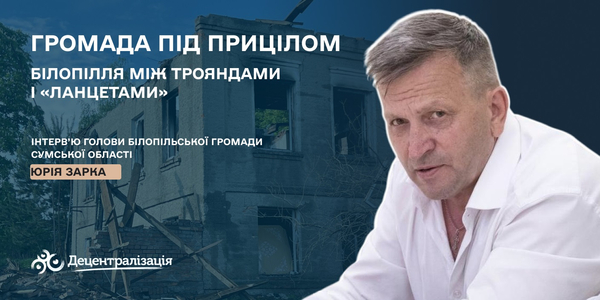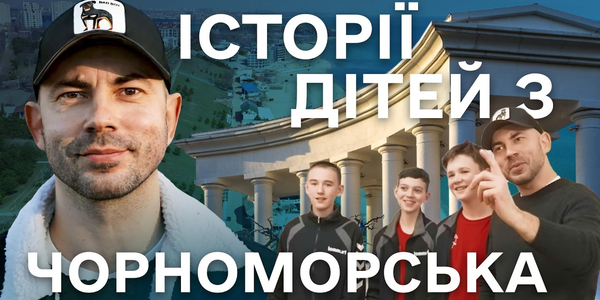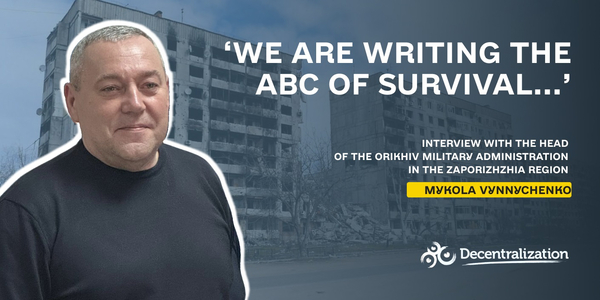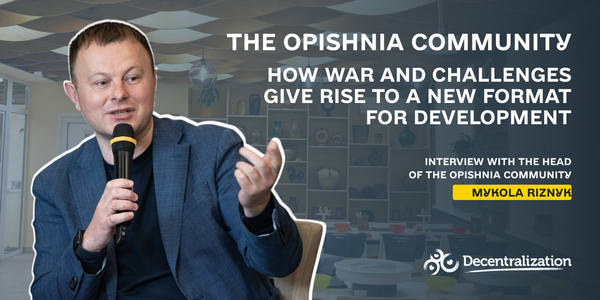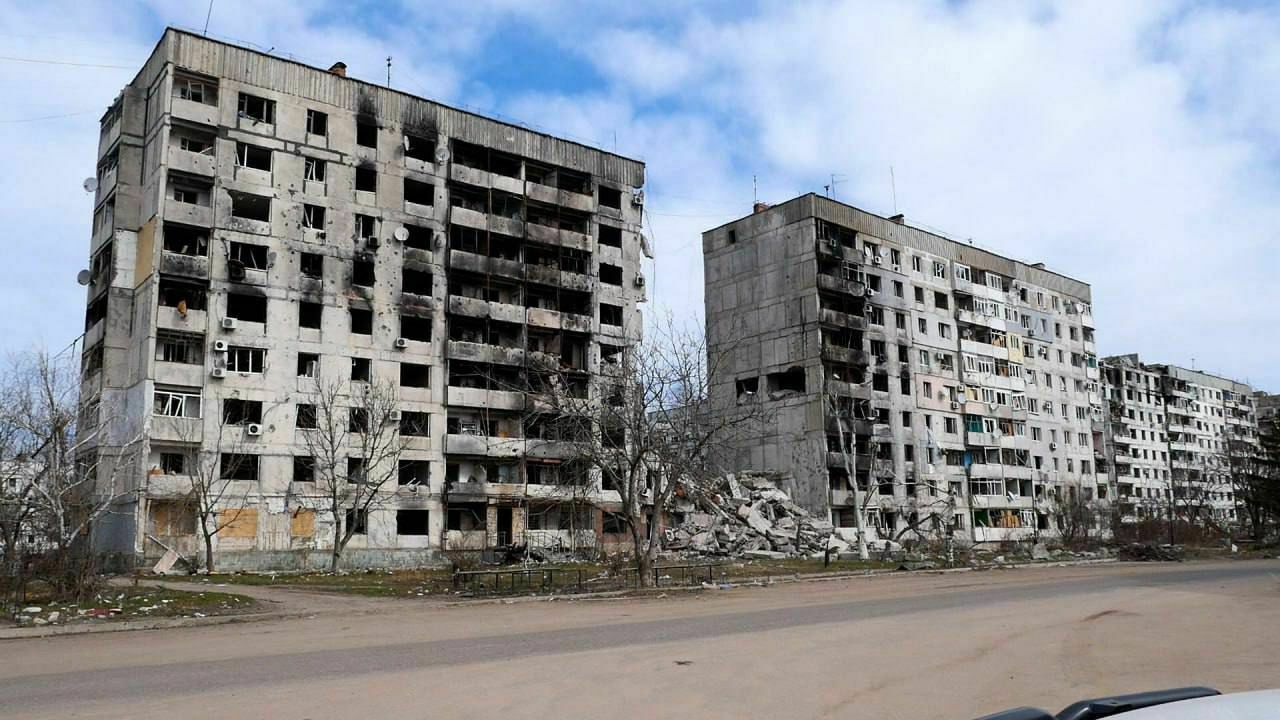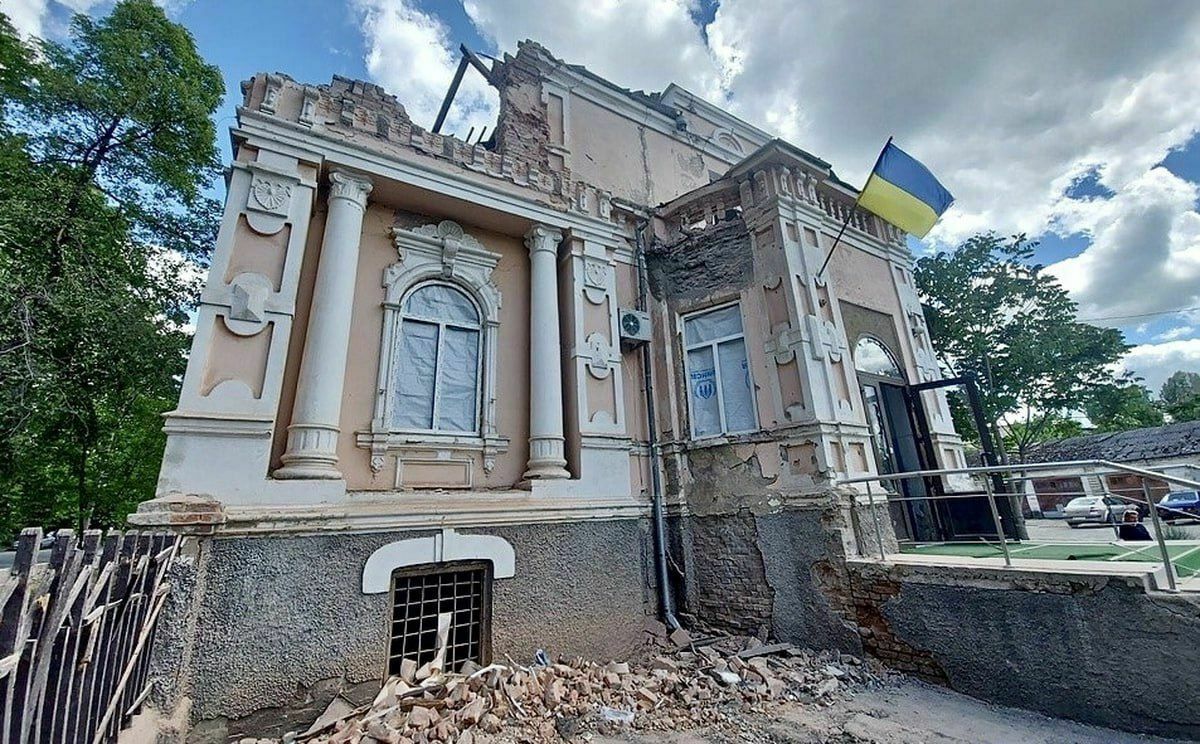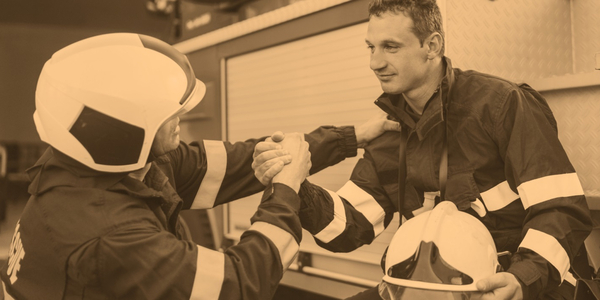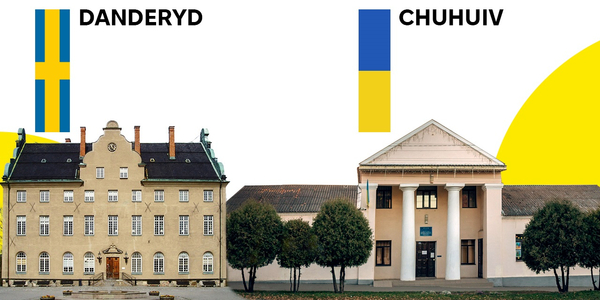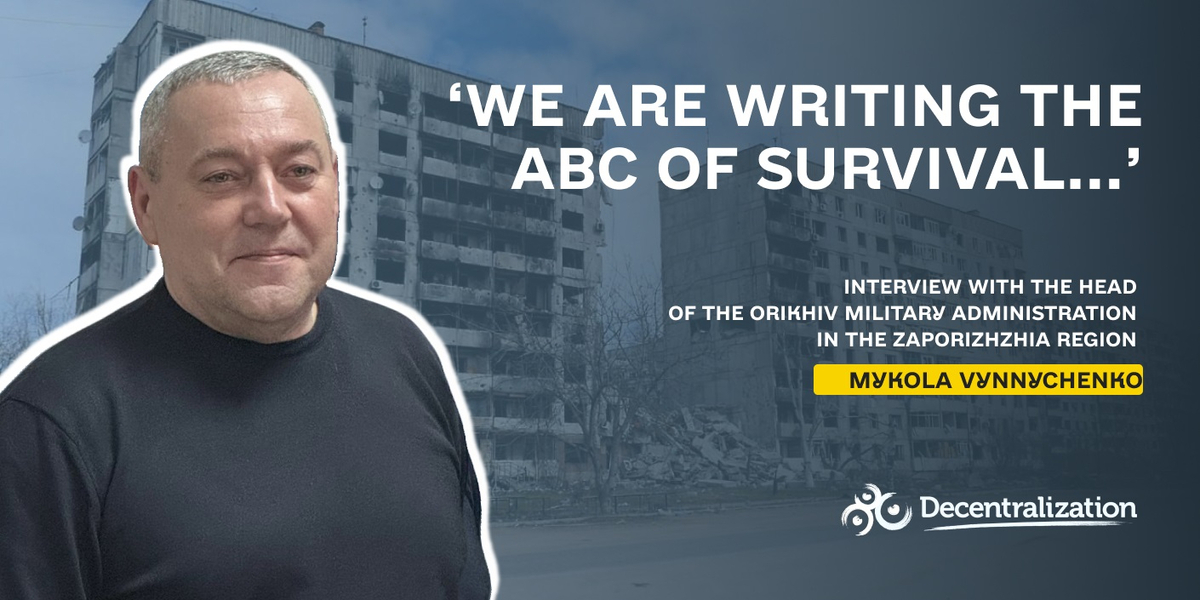
Mykola Vynnychenko, head of the Orikhiv Military Administration in the Zaporizhzhia region, describes life ten kilometres from the front line, the daily cleaning of the virtually destroyed city, the work of the invincibility points, and fresh pies and pizzas at the local market
By Dmytro Syniak
The small town of Orikhiv in the Zaporizhzhia region is about ten kilometres away from the russian military positions. Having stopped there in 2022, the front line has not really moved for three and a half years. The Ukrainian counter-offensive improved the situation somewhat, pushing the russians back outside the village of Robotyne, which is about fifteen kilometres from Orikhiv. However, the Ukrainian army was later forced to retreat to almost its previous positions. All this time, Orikhiv was a key point of Ukrainian defence, and therefore a constant target for russian artillery, aircraft, and drone strikes. It remains so today.
Logically, there should have been no civilians left in a city that was 95 per cent destroyed. But not only did they stay, they managed to make a more or less decent life for themselves, if that is at all possible in the face of daily shelling and the lack of electricity, gas, heating, and mobile communications. The local authorities played a major role in this, never stopping for a single day to provide services to the people. Mykola Vynnychenko, head of the Orikhiv Military Administration in the Zaporizhzhia region, explained to Decentralisation how this was possible. He took office on 7 April 2023, and before the full-scale invasion he had been an entrepreneur and a member of the Orikhiv city council. In February 2022, Mykola refused to leave the city and took an active part in providing its inhabitants with everything they needed, from humanitarian aid to pensions.
Life in a city where nobody should be living
In your interviews last year, you mentioned that Orikhiv had been 70 per cent destroyed and that only around 1,200 of its former 14,000 residents remained. My question is, what is the extent of the destruction now? Are there any people left in the city?
In terms of housing, 95 per cent of the city’s housing stock has been destroyed, and 100 per cent of its critical infrastructure has been damaged. Of the 56 multi-storey buildings, only six remain intact. In our view, a house is intact if it has walls and a roof, even if it has no windows or doors. Others are damaged to varying degrees: sometimes not a single flight of stairs has escaped being ‘folded’ from the first to the last floor, and sometimes the house has been utterly destroyed, leaving only a huge pile of broken bricks... Around 720 people are currently living in these ruins, bringing the total number of residents in the whole community to 1,074. This figure will increase by around 200 in the summer, as many people will return to their gardens. At least, that was the case in previous years.
Will people still come back despite the shelling? Is the shelling less intense now?
We had a faint hope that Putin’s ‘ceasefire’ on 8–9 May would last. We were hoping for at least a brief pause, similar to the one at Easter when the russians were shooting half as much. But our hope was in vain: not only was there no ceasefire, there was not even a hint of one. As usual, around 30 russian FPV drones flew over the territory of our community. This is the reality that we have been living with for the past three years. Some of these drones are shot down and explode on our territory, causing further destruction, while others penetrate Ukrainian airspace. Our community is often targeted by the enemy, who attack it with artillery, aircraft, heavy machine guns, and small arms — everything they can. As a result, little remains of our southernmost villages, Novodanylivka and Novoandriivka. They are only about 3 kilometres from russian military positions. The gunfire there is almost non-stop.
In Orikhiv, multi-storey buildings without windows or doors are considered intact. Only six remain out of 56...
Other multi-storey buildings look like this after the ‘russian world’ reached Zaporizhzhia
And yet people keep returning. Are they not afraid of death or injury? Is living in ruins or in the basement of their own home better than living in a dormitory in Zaporizhzhia?
For many people, it is better, even though dormitories are far from five-star hotels: often four people have to live in one room. Imagine what this is like for the elderly. Dormitory conditions are much better in the centre and west of Ukraine, but most of our people do not want to go there. They want to live as close as possible to their own homes…
… even if they are destroyed?
If your home has been destroyed, you can always move into a neighbour’s house. They will be happy to have someone they know looking after their home. Sometimes, we ask people to sign an evacuation refusal form, which must be renewed every six months. People often respond, ‘To save you the trouble of coming to us every six months, just give us the forms to sign for the next ten years!’ Sometimes, when a person changes their mind and asks us to evacuate them, it is already problematic because russian drones are flying everywhere. We have to rescue people while risking our own lives.
The Holy Intercession Cathedral in Orikhiv after shelling by russian ‘defenders of the Orthodox faith’
What was the reason for your return to Orikhiv personally? After all, you were offered a job at the Department of Agriculture of the Zaporizhzhia Regional Military Administration. It is safer there, so you could have stayed there...
This is my land and my state. I am proud to be able to contribute to its defence by doing what I do best: organising various processes, particularly those relating to local self-government, an area with which I know inside out. I should mention that I only work in Orikhiv, travelling here every day from Zaporizhzhia. The journey is about 60 kilometres along a rough road. I cover this distance twice a day.
About pies that people bake from diesel generators and solar-powered lanterns
Is it true that the community has had no electricity, heating, gas, or mobile phone service since 2022? How have people adapted to these terrible conditions?
We could write the ‘ABC of survival’ and act as instructors for communities that might find themselves in a similar situation. Ukrainians are an invincible nation — we can achieve anything! Our residents have long since prepared their basements quite well and stocked up on batteries, generators, and even solar panels. Indeed, some international organisations have provided us with solar panels and solar-powered lanterns. These lights charge during the day and shine at night.
Communities all over Ukraine are investing heavily in the construction of shelters. Is Orikhiv doing the same?
In our case, it makes no sense because all 56 of our multi-storey buildings have solid basements. We just need to improve the best ones. There are fewer people in need of shelter now. While our basements offer reliable protection against drones and shells, they provide no defence against direct hits from 500 kg guided bombs and missiles, as I have witnessed on more than one occasion. Multi-storey buildings collapse like houses of cards when hit by a guided bomb, leaving people in their solid basements with no chance of survival. The Orikhiv Military Administration has set up invincibility points in three of our most reliable basements, which now house a total of 80 people.
Could you please describe how these invincibility points work?
Essentially, they are dormitories within shelters. These large basements have been made as comfortable as possible. They contain everything from rakes and buckets to beds, baths, and stoves. There are also gas cylinders for cooking and diesel generators to provide electricity. There are also Starlinks to keep this invincibility points in constant contact with the rest of the world. All of this is, of course, paid for by our administration.
Is it true that there is a functioning market in Orikhiv?
Yes, absolutely. Every morning at half past seven, entrepreneurs start selling sausages, cheese, sweets, and other goods. The most skilled ones even bake pies, pizzas, and cakes at home using ovens powered by diesel generators. Of course, their products are 15 per cent more expensive than those in Zaporizhzhia, but people still buy them. The pies are delicious — I have tasted them many times myself!
Does this mean that local businesses are operating, even as they are on the front line?
There are only entrepreneurs at the market. All other businesses stopped working completely in October 2022. Farmers are not cultivating a single hectare. Consequently, the local budget does not receive any taxes. However, people are cultivating their gardens and are very active, planting potatoes, onions and other such produce. This is why, every year, we deliver seeds to them in cooperation with our international partners.
The building of the Orikhiv City Council (the estate of Dutch-born businessman Heinrich Jansen), damaged by shelling on 21 May 2022
‘The military are shocked when they see a garbage truck collecting waste near dilapidated houses...’
People say that public utility services are operating as normal: they are cleaning the city and collecting the waste…
True! If there are people in the community, they need access to services. We cannot just leave them to cope on their own. More than fifty of our utility workers are busy cleaning and taking out the waste every day. They also deliver water to people, pouring it into special containers installed throughout the city. This water is drawn from artesian wells which are powered by diesel generators. We run these generators for several hours a day. Besides this, our utility companies organise the distribution of humanitarian aid from various partners. If shelling occurs, utility workers hide in the basement until the air raid stops. Then they resume their work. The military are sometimes shocked to see a garbage truck collecting waste near dilapidated houses. They cannot believe it. Some say that they have never seen anything like this in any other community along the front line...
What makes them stay on the front line, risking their lives every day?
At the start of my tenure, I gathered all the employees of our three utility companies and told them: ‘If you are scared, resign. We will not consider it betrayal or anything like that. We will pay all debts.’ Only a few people resigned. I think people are holding on to their jobs because there are no other employment opportunities in the community. On the other hand, they also feel like defenders. They are a model of resilience, even to the military.
What about utility vehicles? Don’t the russians burn them? How are they protected?
We keep all our vehicles in shelters in a neighbouring community, 12 kilometres from Orikhiv. They drive there every day to carry out operations and then return. Of course, there is always a risk that a russian drone will fly in and destroy them. No one is immune to this risk, but we cannot do without vehicles. Recently, we lost a Renault Duster, provided by Chemonics International two years ago. While our employees were delivering humanitarian aid to Novodanylivka, their vehicle was attacked by a russian drone. Fortunately, there was nobody in the car at the time. We are still trying to repair the vehicle, but I am not sure if we will succeed. In the last three years, the russians have only burned down one old tractor and one garbage truck. Although the truck was in a shelter, it did not escape the russian guided bomb. But, as I said, there is no escaping a guided bomb.
Did your employees deliver humanitarian aid to Novodanylivka? This is almost on the front line! Are people still living there?
They do, and we cannot leave them behind. We will look for alternative vehicles and adjust the timing of our trips. But we will not stop going there.
The community budget remains at UAH 100 million per year, the same as before the ‘full-scale invasion’
Do the residents pay for utility services?
From 2022, we have decided not to charge people for utility services.
What happens to the community budget in this case? It turns out that there are only expenses and no revenue.
We are very grateful to the state for its help. As a result, we receive the same funds from the state budget as before the full-scale invasion: around UAH 100 million a year. However, previously, around UAH 61 million of this amount came from our own revenues, which are now close to zero.
For a community of 19,000 people, it was probably not a significant amount of money. Now, however, with only around 1,000 residents, each person receives UAH 100,000 per year. What do you spend this money on?
Our first priority is to support the military, as this is the most urgent issue for us. Last year, we provided UAH 23 million in support, and this year we have provided UAH 21 million. We still have requests totalling around UAH 5 million. We also retained our city hospital and primary healthcare centre, the latter of which relocated to Zaporizhzhia. We not only pay the salaries of some of the staff, but also cover the costs of utilities and rent. The same applies to our school. If all goes to plan, the school will open on 1 September, offering a blended learning approach in one of Zaporizhzhia’s underground shelters. We already have our equipment and furniture in place… Operating the invincibility points, three wells, and large and small diesel generators requires a lot of resources. Utilities also consume around UAH 19 million a year. This year, we also had to refund UAH 8 million to Ukrzaliznytsia and UAH 2 million to Zaporizhzhia Oblenerho, the regional power company.
Nothing has been said about financing various social programmes. They must cost a fortune!
Exactly. For instance, we pay UAH 10,000 to each civilian injured in the hostilities. Currently, there are around 300 such civilians. We also pay UAH 10,000 to the relatives of those who have been killed. There have been 78 civilian casualties in three years. This is the cost of russian aggression! In addition, if our residents are mobilised, they receive UAH 20,000; if they are wounded, they receive another UAH 20,000, and if they are demobilised, they receive UAH 15,000. We run programmes to support people with rare diseases. We have also introduced a programme to improve children’s health, and we cover the cost of their travel to and from the recreation camp. We fully fund the running of our home for single people in Zaporizhzhia, in which twenty of our residents live. This home is managed by our social services centre, which is also located in Zaporizhzhia.
In an interview for Decentralisation, Pavlo Kuzmenko, the mayor of Okhtyrka, said that it would be unwise to move hospitals and schools from the frontline zone to other cities. According to him, these cities already have a shortage of doctors and teachers. So why would we need new educational and healthcare facilities there?
I hope that other communities will not suffer the same fate as us! Those who have not lost their land and property cannot understand that, to us, these are more than just schools and medical facilities. They are part of our lives — they are our centres of life! These are the places where our residents gather now. Without these centres, there will be no community. Additionally, many residents of the Polohivskyi district and the regional centre itself now use the services of Orikhiv Hospital in Zaporizhzhia. Put simply, we have a different level of service. I am frankly proud of this, and I regret that I was unable to preserve our kindergartens and cultural institutions in the same way. However, we operate in a free market, and the salaries in our hospitals and schools are the same as in Zaporizhzhia. I do not force anyone to work. But for some reason people do not want to go to work in other hospitals and schools. This suggests that they find value in working in our institutions. Do you think IDPs are needed anywhere? Unfortunately, I have a feeling that this is not the case. Therefore, I simply would not be able to look people in the eye if I closed our hospital and school.
The situation with hospitals is more or less clear, as their services will always be in demand in a large city. But what about the school? Where will it take the first graders each year?
Not to boast, but even working online, we enrolled enough first-year schoolchildren to form three classes last year, mostly from Orikhiv IDPs. It will be even easier when we work offline. I can tell you that it is important for our IDPs to go to their own school. Thanks to this, our people who are living in other localities remain in their community. I think this is very important because it is from such regional patriotism that national patriotism grows.
People have not received certificates for their destroyed homes
Do the local authorities keep in touch with those who have fled? Is there any information about where they are, what is happening to them and whether they want to return?
There are 8,160 of our residents in Zaporizhzhia and the surrounding villages alone — out of the more than 19,000 people who lived here before the full-scale invasion. We have resettled them in a fairly compact manner and keep in touch with them, mainly through the school and hospital we have mentioned. Unfortunately, most international organisations no longer want to provide humanitarian aid to these people, believing that they should have gone to work long ago. But we, who know what rented accommodation is like (and most of our residents live in rented accommodation), try our best to organise humanitarian aid for them at least once every one and a half to two months. We feel responsible for all 4,370 families of Orikhiv residents who have become internally displaced. Last year, we paid UAH 21,000 for the winter period to those who remained in the Zaporizhzhia region. The funds were allocated by the International Red Cross.
How difficult or easy is it now to find help from different donors?
It is difficult to find, and the closure of USAID has only made things worse. By the way, we once received a tractor from this agency under the DOBRE programme, and it is still working… At the moment, World Central Kitchen is helping us the most. This international organisation sends food to our residents every month, mainly the so-called borscht set: beets, onions, potatoes, cabbage, and carrots. The UNDP is doing the same. We are also very grateful to the International Red Cross for providing us with water tanks, which we have placed around the city. Last year, the Red Cross allocated UAH 30,000 to each household in the community so that people who stayed at home could buy what they needed: chickens, a pig, a two-wheel tractor... Charitable organisation “Charity Fund “World. Ukraine. Polohy” has provided our residents with fuel briquettes — 3.5 tonnes per household. These briquettes are much needed, as people cook on conventional stoves, which must be heated with coal, wood, or such briquettes. I would also like to mention the Sonce UA charitable organisation, which supplies our frontline villages and invincibility points with personal care items. Apart from that, volunteers come to us all the time — from the Odesa region, western Ukraine, and elsewhere. They bring everything from food parcels to dog and cat food.
Does your administration search for such help itself?
I personally go to different offices in Dnipro and Zaporizhzhia, communicate, invite people to come and see with their own eyes how people live. Charitable assistance is not a grant, and there is no need to write project proposals, submit packages of documents, and so on. All you need is personal contact. No donor is going to give us grants now, because we are in the area of active hostilities.
Please describe the work on the restoration plan for the territory.
At the moment, this work is frozen because we do not know what might happen to our community’s territory in an hour, let alone a year. The assembly points for people have been defined, and there are already fuelled buses in Zaporizhzhia. Once we get the order, we will be able to evacuate every single resident very quickly. People have been warned about this, of course.
Do the residents of the Orikhiv community receive state certificates for the purchase of new housing to replace destroyed houses and apartments?
Well, no. As I said, we are in an area of active hostilities. In order to issue such a certificate, the law requires a five-member commission to visit the site and assess the level of damage to the house. Their security is the responsibility of the head of the local military administration, which is me. And drones fly there around the clock. Novopavlivka, for example, may seem relatively far from the front line, but it has been shelled since last year. So, I cannot guarantee anyone’s safety even there. If we could agree with the russians on a real, not fake, thirty-day ceasefire, it could solve this problem. Then we could provide such certificates to all our residents who have lost their homes. But many people want to return to our community and rebuild here, not elsewhere. We hope they will eventually be given this opportunity.
What does it take to not only survive on the front line, but to bake cakes there, relatively speaking? What advice would you give to the leaders of other communities?
The key thing is a good team, and, luckily, I have one. We work as one team, and we have the same values. When that happens, we can do anything.
